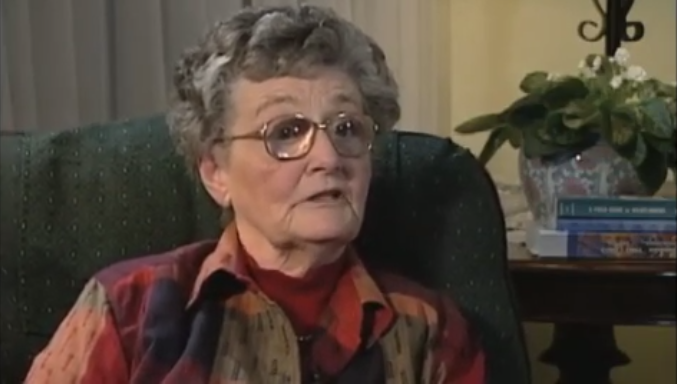Stationed in Scoudouc
Heroes Remember
Stationed in Scoudouc
Transcript
After all those Victory Loan parades and that was our reward, we
went to, the next posting was "Y" Depot in Halifax and when they
said, usually when they said "Y" Depot, that meant you were
shipping out. But we didn't ship out. Instead of that, we went
to, there were 24 of us went to Scoudouc and we were the first
girls on station. We reacted very well and we all agreed it was
the friendliest station that we were ever on and they were very
respectful of us and they were very kind and cooperative. The
first night we were there was, they had dinner and they had, a
special dinner, cooked us a special dinner, and they had white
table cloth on the table. And all the trappings,
and then a photo shoot afterwards.
And they didn't have any barracks for us then and we lived up
over the hospital and there was a, a lounge room and then, it
wasn't too large, the premises were not too large, and they had
a lounge and then they had double bunks.
For a while I worked in a hangar. I was the only girl in the
hangar and I guess there were approximately 500 men in that
hangar and they were, they were very good to us. But when, if
you, there was a lot of overtime because they needed the
aircraft out there and they had to get them repaired, you didn't
get paid overtime, though, as you know,
it was a big pay of $27 a month.
If you had to work overtime though, the boys, two of the boys,
if the Military Police weren't available, two of the boys took
you home. There was never one alone, always two.
But there was a lot of entertainment at Scoudouc.
There was, we had, we were men and women, I mean, we were all,
we were all together in this. There were a lot of sports.
There was minstrel shows, which certainly would not be allowed
today, too racist, but in those days, they were, they thought
they were okay and we put them on. Minstrel shows were mostly
about Black people in those days. And then we had, we had
concerts and singing groups would come in to entertain us, and
then the Big Bands would come and we would have dances. Mark
Henny and his band which was a Canadian band, they would come,
they never charged anything, but sometimes we'd have to raise
money for some United States bands to come up and we'd raise
money for their transportation. Their time was given but raise
money for their transportation, but, but that's the, you know,
between two and three thousand in station, it wasn't such a big,
a big deal. And you wonder where the girls came for the men to
dance with. Well, they came from Moncton, Shediac, everywhere.
And then we had formal dinners, and we'd put on operettas, HMCS
Pinafore was one. And on our days off, we would go to Shediac
and Point-de-Chêne. We had this rickety old bus. Of course, it
was war time, we were lucky to have any kind of a vehicle. And
we'd go out there and, remember when we'd go swimming and I
didn't swim, went out in the water but didn't swim, but we were,
had a changing room which was a loft up over a building and you
had to climb this rickety steps and, and then there were like
barn boards and a lot of light came in it, as much lighting as
there was between each barn board, there was lots of lighting.
So you had to be very skinny to really hide yourself to change
your clothes, there wasn't very much privacy.
At Scoudouc, I worked in the hangars and as I said, I worked,
did office work in there, whatever had to be done. Reports made
on the aircraft were dictated and you had to transcribe them and
so on. And then, and then I worked in the orderly room which
was the Administrative, Administration Building.
Discipline was hard though. They would take us out in the
parade square even in the middle of winter, and put us through
the, our drills, and you never knew when. And you still had to
keep your, that seam in your stocking, you know, that black seam
in your stocking, straight? And your shoes shined and your
buttons shined and so on. I mean, even though you were doing
office work, you still had to be ready for inspection at any
time. But of course, that was all part of discipline.
Description
One woman among five hundred men! Mrs. Grégoire recounts how life was for her and how the "boys" treated her during her very first military posting.
Christina Janet Grégoire
Mrs. Grégoire was born in Campbellton, New Brunswick, on March 1, 1925, and grew up in Sillarsville, Québec. In March 1943, when she was 18, she joined the Air Force in Montréal. After training at Rockcliffe and a first posting in Scoudouc she was given a Top Secret rating by the RCMP before being assigned to the Air Force Headquarters Intelligence Directorate in Ottawa. She was discharged after VJ Day and released in November 1945. She now gives workshops for the United Church and is involved in volunteering in various Hospital Veterans' Wards.
Meta Data
- Medium:
- Video
- Owner:
- Veterans Affairs Canada
- Duration:
- 05:04
- Person Interviewed:
- Christina Janet Grégoire
- War, Conflict or Mission:
- Second World War
- Location/Theatre:
- Canada
- Branch:
- Air Force
- Units/Ship:
- Air Force Headquarters, Directorate of Intelligence (Ottawa)
- Occupation:
- Clerical work
Related Videos
- Date modified:




